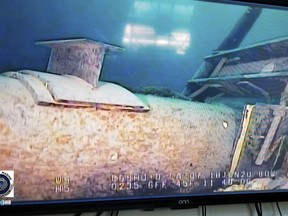
Article content
The Trump administration is stepping into the legal fight over whether Enbridge can continue to operate an aging pipeline beneath a Great Lakes channel, arguing that Michigan Gov. Gretchen Whitmer interfered with U.S. foreign policy when she revoked the line’s easement almost five years ago.
THIS CONTENT IS RESERVED FOR SUBSCRIBERS ONLY
Subscribe now to read the latest news in your city and across Canada.
- Exclusive articles from Barbara Shecter, Joe O'Connor, Gabriel Friedman, and others.
- Daily content from Financial Times, the world's leading global business publication.
- Unlimited online access to read articles from Financial Post, National Post and 15 news sites across Canada with one account.
- National Post ePaper, an electronic replica of the print edition to view on any device, share and comment on.
- Daily puzzles, including the New York Times Crossword.
SUBSCRIBE TO UNLOCK MORE ARTICLES
Subscribe now to read the latest news in your city and across Canada.
- Exclusive articles from Barbara Shecter, Joe O'Connor, Gabriel Friedman and others.
- Daily content from Financial Times, the world's leading global business publication.
- Unlimited online access to read articles from Financial Post, National Post and 15 news sites across Canada with one account.
- National Post ePaper, an electronic replica of the print edition to view on any device, share and comment on.
- Daily puzzles, including the New York Times Crossword.
REGISTER / SIGN IN TO UNLOCK MORE ARTICLES
Create an account or sign in to continue with your reading experience.
- Access articles from across Canada with one account.
- Share your thoughts and join the conversation in the comments.
- Enjoy additional articles per month.
- Get email updates from your favourite authors.
THIS ARTICLE IS FREE TO READ REGISTER TO UNLOCK.
Create an account or sign in to continue with your reading experience.
- Access articles from across Canada with one account
- Share your thoughts and join the conversation in the comments
- Enjoy additional articles per month
- Get email updates from your favourite authors
Sign In or Create an Account
or
Article content
The pipeline, known as Line 5, has moved crude oil between Superior, Wisconsin, and Sarnia, Ontario, since 1953. A 4.5-mile (6.4-kilometer) segment of the line runs under the Straits of Mackinac, a channel that links Lake Michigan and Lake Huron.
Article content
Article content
Article content
Concerns about the line rupturing and causing a catastrophic spill in the environmentally sensitive area have been growing since 2017, when Enbridge revealed its engineers had known about gaps in its protective coating since 2014. A boat anchor damaged the segment a year later, further stoking fears of a spill.
Article content
By signing up you consent to receive the above newsletter from Postmedia Network Inc.
Article content
Whitmer, a Democrat and possible 2028 presidential contender, ordered her regulators in November 2020 to revoke the easement allowing the segment to operate beneath the straits. Enbridge filed a federal lawsuit that same year seeking to invalidate the order. The pipeline has continued to operate as the litigation drags on.
Article content
Trump attorneys say Michigan interfering with foreign policy, 1977 treaty
Article content
The Trump administration isn’t a party in the case. But U.S. Justice Department attorneys filed a brief on Sept. 12 arguing that Whitmer’s order amounted to an attempt to “globalize” Michigan’s regulatory authority and clash with the federal government’s goal of maintaining the flow of energy between the U.S. and Canada.
Article content
They also contend that the revocation clashes with executive orders President Donald Trump issued this year declaring that an abundant, reliable energy supply is key to protecting national security.
Article content
Article content
“Shutting down Line 5 could disrupt the energy supply chain, increase domestic prices, and enhance the economic and political power and leverage of malign foreign actors worldwide,” the attorneys wrote. “Such outcomes conflict with our nation’s foreign policy goals.”
Article content
They argue, too, that only the federal government can regulate pipeline safety and allowing states to enter that arena would lead to a untenable patchwork of regulations. A 1977 treaty between the U.S. and Canada prohibits authorities from impeding the flow of energy through pipelines running between the two counties, they add.
Article content
Whitmer’s attorneys say the state has authority to revoke the easement under the public trust doctrine, the legal principle that natural resources belong to the public and the state therefore has a duty to protect them.
Article content
Danny Wimmer, a spokesperson for Michigan Attorney General Dana Nessel, who is defending the revocation, said in an email Friday that Nessel plans to file a response in October. He pointed to earlier filings in which she argues that revoking the easement doesn’t impose or continue any safety regulations and is actually a pipeline routing decision within the state’s authority. The filings also contend that private parties such as Enbridge can’t bring a federal lawsuit to enforce the treaty with Canada.

.jpg) 1 hour ago
3
1 hour ago
3
 English (US)
English (US)